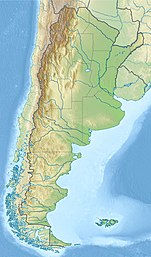| Blanca Bay | |
|---|---|
| Bahía Blanca ( Spanish) | |
| Location | South America |
| Coordinates | 39°03′44″S 62°04′00″W / 39.06222°S 62.06667°W |
| River sources | Sauce Chico River, Napostá Stream |
| Ocean/sea sources | Argentine Sea, South Atlantic Ocean |
| Basin countries | Argentina |
| Settlements | Punta Alta, Bahía Blanca, General Daniel Cerri, Ingeniero White |
Blanca Bay ( Spanish: Bahía Blanca [1]) is a bay of the Argentine Sea located in the transition between Pampas and Patagonia. This bay is a deep and narrow sea inlet on the continent. It is located in the southwest of the province of Buenos Aires, in the center-east of Argentina. Its name gave its own name to the most important city near its banks, the city of Bahía Blanca.
Toponymy
Bahía Blanca means "White Bay". The name is due to the typical colour of the salt covering the soil surrounding the shores. The bay (which is actually an estuary) was seen by Ferdinand Magellan during his first circumnavigation of the world on the orders of Charles I of Spain, in 1520, looking for a canal connecting the Atlantic to the Pacific Ocean along the coasts of South America. [2] [3]
References
- ^ Bahía Blanca at GEOnet Names Server
- ^ "La primera circunnavegación de la tierra" [The first circumnavigation of the world] (in Spanish). Pontifical Catholic University of Chile. Retrieved 23 July 2015.
- ^ Falkner, Tomas. "Descripción de Patagonia y de las partes adyacentes de la América meridional, que contiene una razón del suelo, producciones, animales, valles, montañas, ríos, lagunas... / escrita en inglés por Tomas Falkner, que residió cerca de 40 años en aquellas partes" [Description of Patagonia and adjacent parts of South America, which contains a ratio of soil, production, animals, valleys, mountains, rivers, ponds... / written in English by Tomas Falkner, who lived about 40 years in those parts]. Cervantesvirtual.com (in Spanish). Retrieved 23 July 2015.
| Blanca Bay | |
|---|---|
| Bahía Blanca ( Spanish) | |
| Location | South America |
| Coordinates | 39°03′44″S 62°04′00″W / 39.06222°S 62.06667°W |
| River sources | Sauce Chico River, Napostá Stream |
| Ocean/sea sources | Argentine Sea, South Atlantic Ocean |
| Basin countries | Argentina |
| Settlements | Punta Alta, Bahía Blanca, General Daniel Cerri, Ingeniero White |
Blanca Bay ( Spanish: Bahía Blanca [1]) is a bay of the Argentine Sea located in the transition between Pampas and Patagonia. This bay is a deep and narrow sea inlet on the continent. It is located in the southwest of the province of Buenos Aires, in the center-east of Argentina. Its name gave its own name to the most important city near its banks, the city of Bahía Blanca.
Toponymy
Bahía Blanca means "White Bay". The name is due to the typical colour of the salt covering the soil surrounding the shores. The bay (which is actually an estuary) was seen by Ferdinand Magellan during his first circumnavigation of the world on the orders of Charles I of Spain, in 1520, looking for a canal connecting the Atlantic to the Pacific Ocean along the coasts of South America. [2] [3]
References
- ^ Bahía Blanca at GEOnet Names Server
- ^ "La primera circunnavegación de la tierra" [The first circumnavigation of the world] (in Spanish). Pontifical Catholic University of Chile. Retrieved 23 July 2015.
- ^ Falkner, Tomas. "Descripción de Patagonia y de las partes adyacentes de la América meridional, que contiene una razón del suelo, producciones, animales, valles, montañas, ríos, lagunas... / escrita en inglés por Tomas Falkner, que residió cerca de 40 años en aquellas partes" [Description of Patagonia and adjacent parts of South America, which contains a ratio of soil, production, animals, valleys, mountains, rivers, ponds... / written in English by Tomas Falkner, who lived about 40 years in those parts]. Cervantesvirtual.com (in Spanish). Retrieved 23 July 2015.
